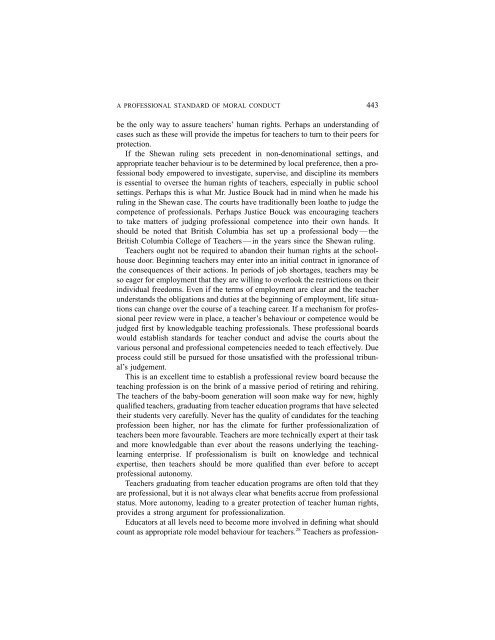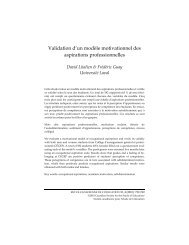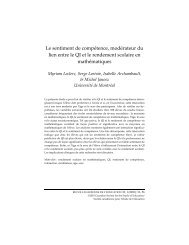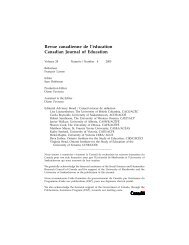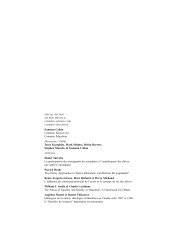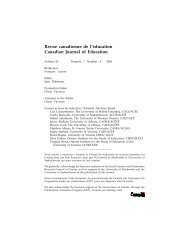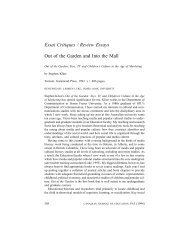Mireille Falardeau et Michel Loranger Le choix de stratégies ... - CSSE
Mireille Falardeau et Michel Loranger Le choix de stratégies ... - CSSE
Mireille Falardeau et Michel Loranger Le choix de stratégies ... - CSSE
Create successful ePaper yourself
Turn your PDF publications into a flip-book with our unique Google optimized e-Paper software.
A PROFESSIONAL STANDARD OF MORAL CONDUCT 443<br />
be the only way to assure teachers’ human rights. Perhaps an un<strong>de</strong>rstanding of<br />
cases such as these will provi<strong>de</strong> the imp<strong>et</strong>us for teachers to turn to their peers for<br />
protection.<br />
If the Shewan ruling s<strong>et</strong>s prece<strong>de</strong>nt in non-<strong>de</strong>nominational s<strong>et</strong>tings, and<br />
appropriate teacher behaviour is to be d<strong>et</strong>ermined by local preference, then a professional<br />
body empowered to investigate, supervise, and discipline its members<br />
is essential to oversee the human rights of teachers, especially in public school<br />
s<strong>et</strong>tings. Perhaps this is what Mr. Justice Bouck had in mind when he ma<strong>de</strong> his<br />
ruling in the Shewan case. The courts have traditionally been loathe to judge the<br />
comp<strong>et</strong>ence of professionals. Perhaps Justice Bouck was encouraging teachers<br />
to take matters of judging professional comp<strong>et</strong>ence into their own hands. It<br />
should be noted that British Columbia has s<strong>et</strong> up a professional body — the<br />
British Columbia College of Teachers — in the years since the Shewan ruling.<br />
Teachers ought not be required to abandon their human rights at the schoolhouse<br />
door. Beginning teachers may enter into an initial contract in ignorance of<br />
the consequences of their actions. In periods of job shortages, teachers may be<br />
so eager for employment that they are willing to overlook the restrictions on their<br />
individual freedoms. Even if the terms of employment are clear and the teacher<br />
un<strong>de</strong>rstands the obligations and duties at the beginning of employment, life situations<br />
can change over the course of a teaching career. If a mechanism for professional<br />
peer review were in place, a teacher’s behaviour or comp<strong>et</strong>ence would be<br />
judged first by knowledgable teaching professionals. These professional boards<br />
would establish standards for teacher conduct and advise the courts about the<br />
various personal and professional comp<strong>et</strong>encies nee<strong>de</strong>d to teach effectively. Due<br />
process could still be pursued for those unsatisfied with the professional tribunal’s<br />
judgement.<br />
This is an excellent time to establish a professional review board because the<br />
teaching profession is on the brink of a massive period of r<strong>et</strong>iring and rehiring.<br />
The teachers of the baby-boom generation will soon make way for new, highly<br />
qualified teachers, graduating from teacher education programs that have selected<br />
their stu<strong>de</strong>nts very carefully. Never has the quality of candidates for the teaching<br />
profession been higher, nor has the climate for further professionalization of<br />
teachers been more favourable. Teachers are more technically expert at their task<br />
and more knowledgable than ever about the reasons un<strong>de</strong>rlying the teachinglearning<br />
enterprise. If professionalism is built on knowledge and technical<br />
expertise, then teachers should be more qualified than ever before to accept<br />
professional autonomy.<br />
Teachers graduating from teacher education programs are often told that they<br />
are professional, but it is not always clear what benefits accrue from professional<br />
status. More autonomy, leading to a greater protection of teacher human rights,<br />
provi<strong>de</strong>s a strong argument for professionalization.<br />
Educators at all levels need to become more involved in <strong>de</strong>fining what should<br />
count as appropriate role mo<strong>de</strong>l behaviour for teachers. 28 Teachers as profession-


